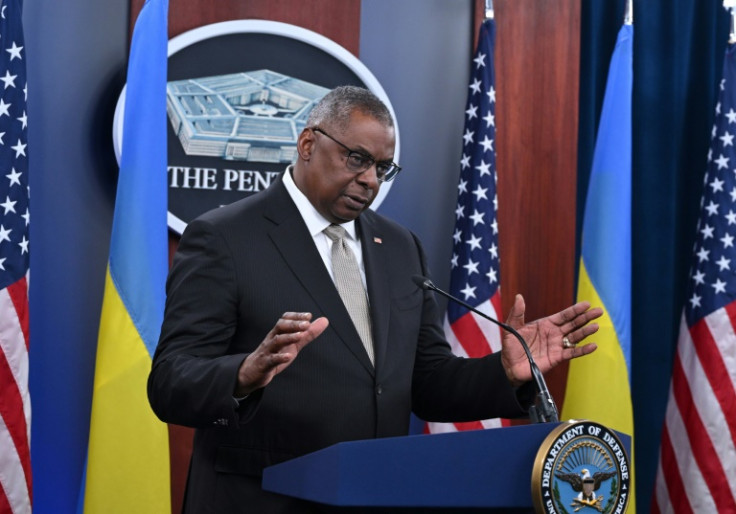US Warns Of China's 'Dangerous Behavior' Even As Competition Defines Relations With Beijing
KEY POINTS
- Despite tensions, Washington and Beijing have called for keeping lines of communication open
- U.S. asked Beijing to 'fully enforce' existing U.N. Security Council resolutions on North Korea
- Calling Taiwan a 'red line' China said it has the 'backbone' to protect 'unity of the motherland'
Amid strained bilateral ties and heightened tensions in the Indo-Pacific region, Defense Secretary Lloyd Austin met his Chinese counterpart Gen. Wei Fenghe on Tuesday on the sidelines of a regional meeting in Cambodia.
The two leaders discussed a range of regional and global security challenges relating to Taiwan, North Korea, the potential use of nuclear weapons in Ukraine, and Chinese aircraft flyovers in the Indo-Pacific, as per a readout issued by the defense department.
Both Austin and Wei are in Siem Reap, Cambodia attending a meeting of defense ministers from the Association of Southeast Asia Nations (ASEAN).
At the meeting, Austin stressed the need for substantive dialogue to reduce strategic risk and improve crisis communications, and enhance operational safety. The defense secretary also raised concerns "about the increasingly dangerous behavior demonstrated by PLA aircraft in the Indo-Pacific region" that increases the risk of an accident.
On the question of Taiwan, the two leaders had a "lengthy exchange" with Austin reiterating that the U.S. would oppose any attempt by Beijing to make unilateral changes to the status quo.
Adding that Washington will fulfill its commitments under the Taiwan Relations Act, the defense secretary urged Beijing to refrain from further "destabilizing actions" toward Taiwan. Austin also asserted that the U.S. military will continue to fly, sail and operate wherever international law allows.
Underscoring how both the U.S. and China oppose the use of nuclear weapons or threats to use them, Austin called on Beijing to "fully enforce" the existing U.N. Security Council resolutions on North Korea.
This is the second face-to-face meeting between the two high-ranking officials coming in a span of six months. Austin had last met Wei at the Shangri-la Dialogue in Singapore in June.
The latest meeting between the two defense leaders follows a meeting between President Joe Biden and Chinese President Xi Jinping on Nov. 14 in Bali, Indonesia held on the sidelines of the G20 summit.
At their meeting in Bali, both Biden and Xi spoke of cooperation and communication to manage differences. Biden reiterated that competition between the two countries should not veer into conflict while underscoring the need to keep open lines of communication.
Meanwhile, the Chinese president pointed out that relations between the countries should not be that of which one nation tries to out-compete or thrive at the expense of the other.
Although Austin's meeting with Wei on Tuesday was in line with the call to keep open lines of communication between Washington and Beijing, competition remains the defining feature of the relationship between the two nations, a senior U.S. defense official reportedly said after the meeting.
Meanwhile, in a sign that tensions between the two power are not expected to abate anytime soon, an Associated Press report quoted the official statement issued by China's Defense Ministry after the meeting saying that "The responsibility for the current situation facing China-U.S. relations is on the U.S. side, not on the Chinese side."
Wei reportedly warned that Taiwan was a "red line" and Chinese forces had "the backbone, the determination, the confidence and the ability to resolutely safeguard the unity of the motherland."
Tensions between Washington and Beijing reached a high point in August since House Speaker Nancy Pelosi's visit to Taiwan. China responded by ordering several days of military drills around the island which China claims to be part of its territory and has long vowed to "reunify" with the mainland, by force if necessary. The U.S. has repeatedly warned that it would intervene "militarily" should China attempt an invasion of Taiwan.

© Copyright IBTimes 2025. All rights reserved.






















